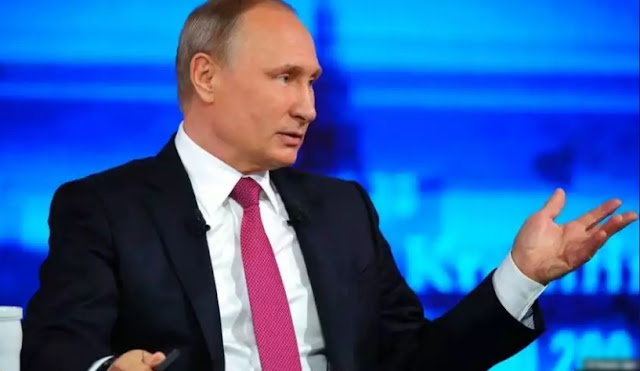MOSCOW — Facing a wave of popular unrest not seen in Russia in years, President Vladimir Putin took to the nation’s airwaves Thursday for his annual call-in show that gives Russians the chance to take up their problems directly with the Kremlin leader.
“Direct Line with the President” is airing just three days after tens of thousands of people turned out in more than 180 cities across Russia to express their dissatisfaction with the Russian government, the most widespread protest in the country since Putin returned to the presidency in 2012.
But barring an unforeseen — but not unprecedented — glitch, don’t expect anyone to truly put Putin on the spot. The event is highly choreographed to show the Russian leader as a man who understands the lives of his citizens, especially their mistrust of the bureaucracy that stands between them and the Kremlin.
“As always, unfortunately, people often say that it can be easier to get through to the president than to the leaders of their own regions,” Putin’s spokesman, Dmitry Peskov, acknowledged in remarks to reporters on Wednesday.
In previous years, the telethon has lasted close to four hours as Putin answers usually about 80 questions from citizens who are shown on split screens making their appeals — all of them pre-screened.
In the days leading up to this year’s show, more than 1.5 million Russians had submitted questions, some of which were displayed on the official website of the show.
Many of them asked Putin to address the poor state of roads, housing, construction projects, the mortgage market, education and the accountability of officials. One young man asked why so many young Russians want to emigrate. Several asked Putin to explain why the rest of the world fears Russia. And there was the odd softball, such as the Russian who wanted to pass along his hope for peace in Syria.
In recent months, there have been rallies by long-distance truckers angry about road tolls, apartment owners angry about a massive plan to relocate as many as 1.6 million Muscovites, and Russians up in arms about official corruption.
This turbulence is not likely to prevent Putin, whose approval rating hasn’t been below 80 percent in three years, from winning reelection next March, but pollsters say Russians feel like their leaders are unaccountable.
Putin often uses the annual call-in forums to press a central point — Ukraine in 2014, the economic crisis in 2015 — but also takes queries about such issues as the need for exercise machines in provincial health centers and a marital dispute about getting a new dog.
One man living in an isolated village in Russia’s Far East complained about the high cost of motor-vehicle taxes, even though there are no roads in his village and the nearest highway is 50 kilometers away. In response, Putin started laughing on air and asked the man, “Why do you need a car, if there are no roads? Where do you drive? Hahaha!”
Putin’s responses may come off as spontaneous, but the show is not, except for the occasional glitch.
In 2015, a crawl on the bottom of the screen showed questions that were obviously unedited, such as “Why has Mr Putin established an authoritarian regime which is turning into a totalitarian one?”
The news site RBC.ru this week reported that a rehearsal of the call-in show took place in a Moscow suburban resort. Guests were divided into groups and asked to read their questions for Putin to clerks who “made notes in a notebook,” according to the report.
The audience were advised not to drink alcohol the day before the show, and not to drink too much water because the show could last up to five hours. The audience were also advised not to wear checkered or striped clothing.
Peskov acknowledged that there was meeting with participants to discuss logistics but denied that it was a rehearsal.
Natalya Abbakumova contributed to this report.
